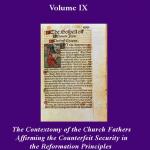
(8-15-00)
***
Bart Brewer, former Catholic priest (d. 2005), was a leading anti-Catholic “missionary” (Mission to Catholics, International, San Diego). I thought it would be interesting to take note of something he wrote about himself: the first reason which he felt compelled him to make a move out of Catholicism:
* * *
Bart Brewer, a professional anti-Catholic, recounted his love affair with a high school girl, while still a priest under vows:
I enjoyed watching the girls giggle as they flirted with teasing boys. After a while, though, my attention was drawn to one of the more diligent students, who thoroughly captivated my interest . . . She was lovely and shyly responded as we stole moments talking alone after class. This was a new adventure, and I soon interpreted our newly discovered affection as love. (Far From Rome, Near to God, compiled by Richard Bennett and Martin Buckingham, Lafayette, Indiana: Associated Publishers & Authors, Inc., 1994, 31-32)
Might this tome more accurately be called, “Far from Self-Restraint, Close to Teenage Girls”?
I commend Brewer at least for his candid admission of the compelling reason which caused him to begin his odyssey out of the Catholic Church. We’ve known this sort of thing goes on all the time among liberal or apostate priests. It’s refreshing to have someone admit it for a change. Thanks, Bart! He himself freely admits that opposition to mandatory celibacy was the initial reason for his starting to seriously doubt the teaching and authority of the Catholic Church:
I listened with interest as some openly discussed the impractical nature of mandatory celibacy. Soon I also gained the courage to question the authorities of our church who persisted in retaining such traditions . . . For the first time in my life, I doubted the authority of my religion . . . . (Ibid., 32)
Now, if James White, an active anti-Catholic who likes to think of himself as being more scholarly and sophisticated than many other anti-Catholics, doesn’t care to defend the propriety and morality of late 20-ish (or even older) men falling in love with 14-17 year old girls (wholly apart from the question of the seriousness of vows of celibacy), then perhaps he could explain why he had Bart Brewer write the foreword to his book against the Catholic Church, The Fatal Flaw (Southbridge, Massachusetts: Crowne Publications, 1990)? White chided Karl Keating in a post dated 8-23-05: “He still takes shots [in his e-letter] at Bart Brewer every once in a while, though why he would do so is difficult to understand.”
This is just one illustrative example of many, with regard to the pitiful and pathetic reasons oftentimes responsible for persons leaving the Catholic faith and/or priesthood. Brewer admitted this in print; I merely repeat it, to help support a contention of mine I have long held. I suspect that Brewer would try to blame the vow of celibacy itself for making him “stumble” and fall in love with an underage schoolgirl. But that’s a bit too simplistic, since he himself knew full well what he was getting into, becoming a Catholic priest in the Roman rite. He chose to do so, and was under no compulsion.
Once he discovered that he was weak in the area of celibacy, he decided to blame the discipline and the Church (and in effect render his own solemn (voluntary) vows null and void, rather than confess his own mistake of undertaking a lifestyle which he was unsuited for and not called to by God. This is no “disproof” whatsoever of priestly celibacy and is throwing the baby out with the bathwater. But time and again, in the current era, and throughout Church history, we have seen this issue used and exploited as a means to break with the Church.
As to the biblical teaching (as opposed to Luther’s and that of many former priests such as Bart Brewer) on the seriousness of vows and oaths, I cite three Protestant Bible Dictionaries:
It is no sin to vow or not to vow, but if made . . . a vow is as sacredly binding as an oath (Deut 23:21-23) . . . The seriousness of oaths is emphasized in the laws of Moses (Ex 20:7, Lev 19:12) . . . Ezekiel speaks as if perjury were punishable by death (Ezek 17:16 ff.) . . . Christ taught that oaths were binding (Matt 5:33) . . . Christ himself accepted the imprecatory oath (Matt 26:63 ff.), and Paul also swore by an oath (2 Cor 1:23, Gal 1:20) . . . God bound himself by an oath (Heb. 6:13-18). (J. D. Douglas, editor, The New Bible Dictionary, Grand Rapids, Michigan: Eerdmans, 1962, 1313, 902)
Oaths were solemn commitments and not to be taken lightly. The 3rd commandment of the Decalog forbids oaths that are made thoughtlessly (Ex 20:7, Deut 5:11); the 9th commandment forbids perjury. An oath must be fulfilled . . . (Ecc 5:4-5). (Allen C. Myers, editor, Eerdmans Bible Dictionary, Grand Rapids, Michigan: Eerdmans, 1987; English revision of Bijbelse Encyclopedie, edited by W. H. Gispen, Kampen, Netherlands: J. H. Kok, rev. ed., 1975, translated by Raymond C. Togtman & Ralph W. Vunderink, 773-774)
The apostle Paul . . . had his hair cut off . . . ‘for he had taken a vow’ (Acts 18:18) . . . Vowing was voluntary. But after a vow was made, it had to be performed . . . Deception in vowing is an affront to God and brings His curse (Mal 1:14) . . . Lying about an oath could result in death (Ezek 17:16-18). Jesus Himself was bound by an oath (Matt 26:63-4), as was Paul (2 Cor 1:23, Gal 1:20). Even God bound Himself by an oath. (Herbert Lockyer, Sr., editor, Nelson’s Illustrated Bible Dictionary, Nashville: Nelson, 1986, 1088, 767)
For related reading, see: “Bart Brewer, a Priest Turned Anti-Catholic” (Karl Keating, 1-10-17)
***
Photo credit: Bart Brewer, from the Keating article mentioned directly above.
***













